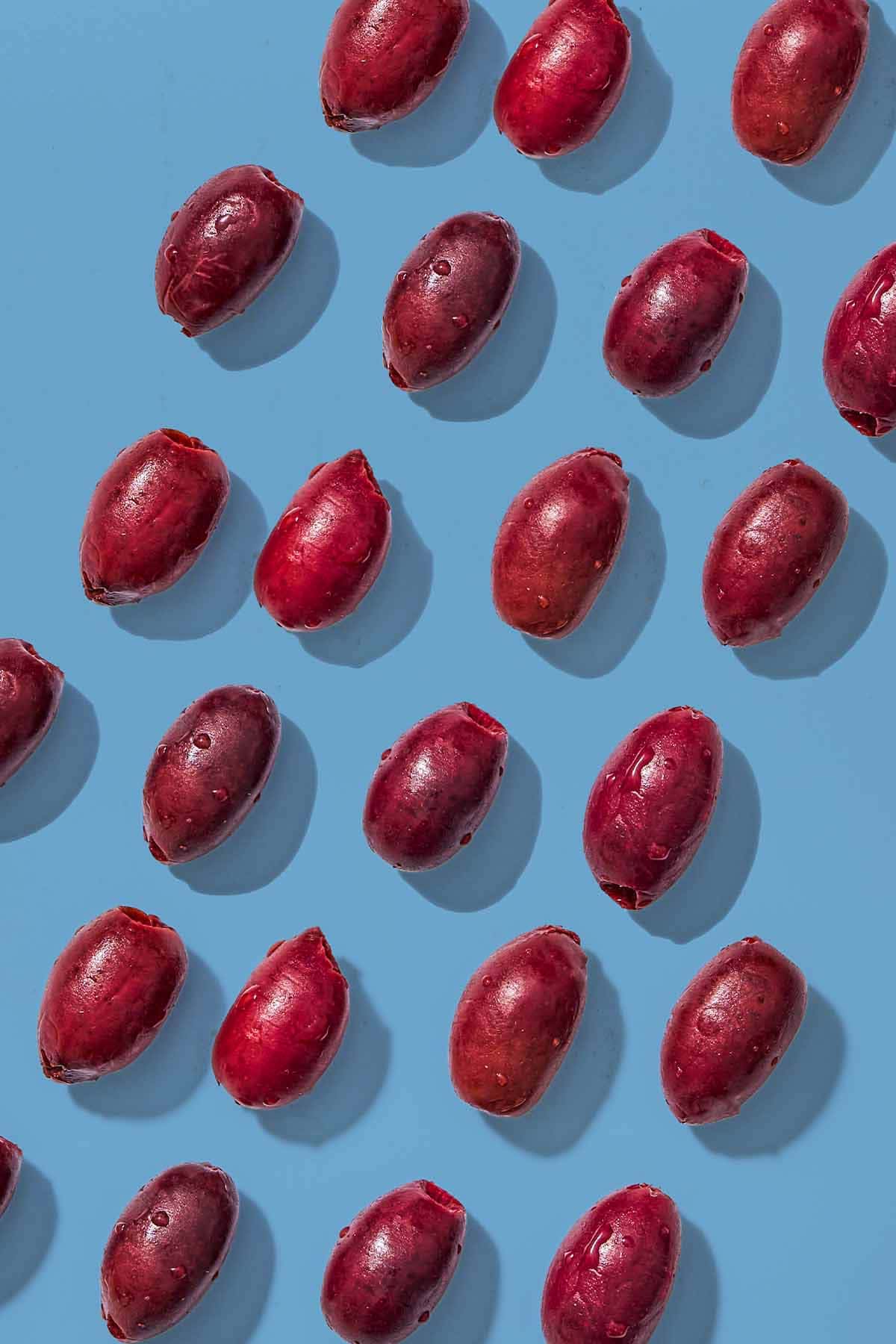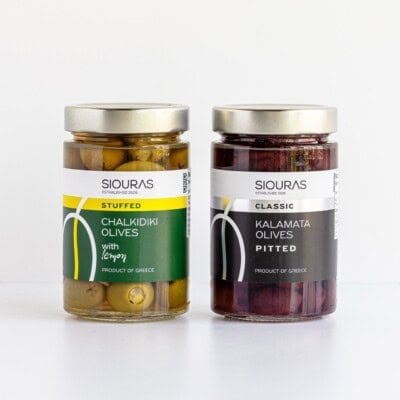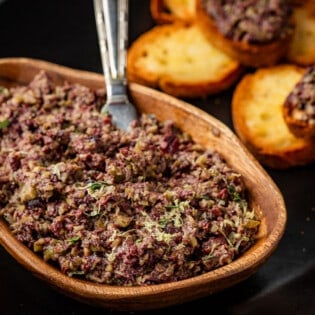Olives are a central component of the Mediterranean diet, both whole and pressed into olive oil. But their rich, briny, and often intensely salty flavor may leave you wondering: are olives healthy? Read on to learn about the health benefits of olives, and the many delicious ways to eat them!

I have loved olives since childhood, especially at my grandmother’s table where they were part of the holiday hors d’oeuvres tray. My sisters and I would slip them onto our fingers before popping them into our mouths. That early love has stayed with me, and today, olives remain a favorite ingredient in my kitchen.
As a Registered Dietitian who specializes in the Mediterranean Diet, this love has served me well! Olives remain a foundational ingredient and trusted pantry staple in the region, where you’ll find them in everything from vibrant salads and rustic focaccia to savory pizzas. They’re simmered with chicken and fish, blended into tapenades, and sprinkled across charcuterie and cheese boards.
These small-but-mighty flavor makers are more than just delicious! Olives pack an impressive nutritional punch, providing healthy monounsaturated fats and powerful antioxidants. They are also one of the oldest forms of fermented foods that provide probiotics!
So let’s get into the nitty-gritty of what the science says about the benefits of olives, as well as some olive FAQs, like how to store olives, what exactly are olives, our favorite olive recipes, and more.
Table of Contents

5 Health Benefits of Olives
Olives are a nutrient-dense addition to most any savory meal. Here are five of the top benefits of olives:
- Heart Health: Olives are rich in mono-unsaturated fatty acids (MUFA), especially oleic acid, which helps reduce LDL cholesterol (“bad” cholesterol) and may improve and support blood pressure levels.
- Rich Source of Antioxidants: Olives are a rich source of polyphenols, including oleuropein and hydroxytyrosol, as well as Vitamin E, an important antioxidant that protects cells from damage. Together, these compounds help reduce oxidative stress and may lower the risk of chronic diseases. What’s more, the oleic acid content and powerful antioxidants in olives may help reduce inflammation and oxidative damage, potentially lowering the risk of certain cancers.
- Blood Sugar Balance: The healthy fats and fiber in olives may help slow digestion, which can aid in managing post-meal blood sugar levels. Additionally, polyphenols in olives have anti-inflammatory effects, which may lower the risk of developing type 2 diabetes.
- Gut Health: Fermented olives contribute beneficial bacteria to your gut microbiome, which may promote digestive health and support immune function.
- Cognitive Health: Early research suggests a link between oleocanthal, a compound found in olive oil, and reduced cognitive decline. While promising, more research is needed to confirm these effects.

What are Olives?
Olives are classified as drupes, along with peaches, plums, cherries, and other stone fruits, a fruit family characterized by a hard stone in their center (in other words, the pit). There are many varieties of olives, each with its unique flavor, size, and texture, which depend on where they originated and how they are prepared.
The olive tree is one of the oldest known trees. Though believed to have originated in Africa, it eventually spread to Morocco, Algeria, and Tunisia, before making its way to Greece, Italy, and other Mediterranean countries.
Olive Varieties: Green vs Black Olives
Green olives are picked before they are ripe, whereas black olives are fully ripened. Once olives are picked, they are either made into oil or cured. There are various methods of curing olives, including brining, dry-curing (using salt), water-curing, oil-curing, and lye-curing. These techniques influence taste and probiotic potential.
You will find olives labeled by country, such as Greek, or by their specific variety name, such as Kalamata. Many olive varieties are named after their place of origin, like Greek Kalamata or Portuguese Negrinha. Olives come in a variety of shades, ranging from green to black.

How to Enjoy Olives on the Mediterranean Diet
While olives are rich in heart-healthy fats, they’re also often calorie-dense and high in sodium, so mindful portion sizes are key. I usually recommend enjoying about 1/4 cup, or a small handful, per day.
- Snacks: They’re perfect alone or can be enjoyed with nuts or as part of a mezze platter.
- Tapenade: Spoon onto focaccia, as a dip for crudité, or served alongside grilled fish and chicken.
- Salads: Toss into Greek salad or enjoy with a Niçoise Salad.
- Entrees: Sprinkle on pizza, flatbreads, your favorite pasta (like puttanesca), fish, or chicken.
How to Store Olives
Store unopened olive jars in a cool, dark place, such as a pantry or cupboard. Store opened olives in the refrigerator in an airtight container. Ensure olives remain fully submerged in brine or oil to prevent them from drying out. Throw away olives if they develop an off smell, mold, or slimy texture.
Enjoy Olives in These Recipes!
Dips and Condiments
Olive Tapenade
Mediterranean Diet Recipes
Olive Salad with Lemon-Pomegranate Dressing
Browse all Mediterranean recipes.
Visit Our Shop.

Bundle and Save!
Bring the authentic flavors of Greece to your table with Greek Kalamata Olives and Green Chalkidiki Olives Stuffed with Lemon.






